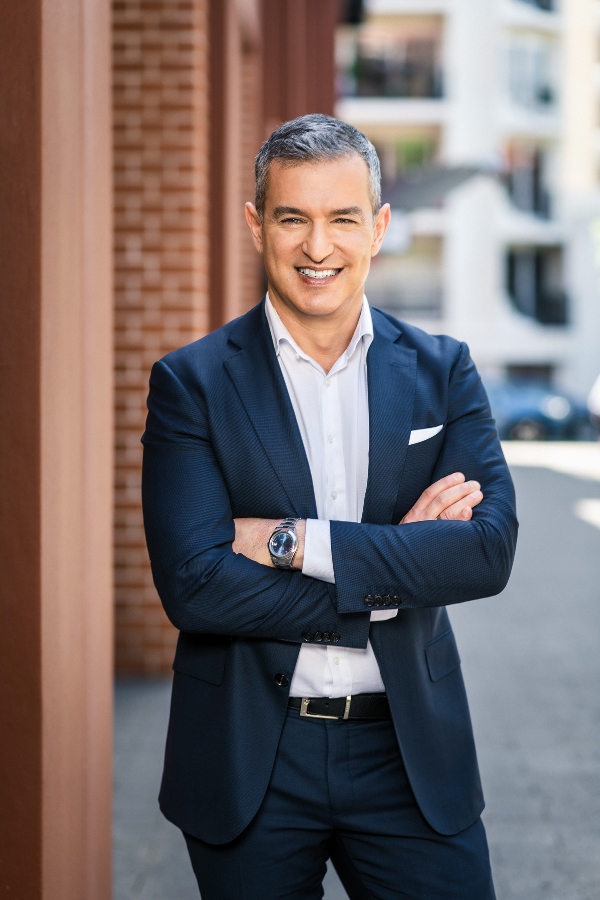Paul Zahra‘s energy, enthusiasm and expertise are renowned throughout the retail industry. The former CEO and Managing Director of David Jones began his career on the shop floor of Target more than 25 years ago and his achievements span advisory roles to some of the world’s and Australia’s leading retailers, a strong commitment to diversity and inclusion and senior leadership roles and board memberships. He took on the role of CEO of the Australian Retailers Association (ARA) in April last year and began a strategic re-brand to give the 118 year old organisation a more contemporary and relevant edge in the fast-changing retail landscape.
They wanted someone with a high profile and it was a great opportunity to make a real difference, says Zahra. “The ARA is Australia’s largest retail association, representing a $350 billion sector which employs 1.2 million Australians – one in 10 workers. We are a not-for-profit organisation, so every dollar is re-invested in initiatives to support our membership. Our thousands-strong network includes SMBs and major retailers such as David Jones and Myer and has grown strongly since the re-branding”.
Strategic Partners The Way Forward/ Global Benchmarking
One of my first tasks was to change the narrative and perception in the media, he says. “The ARA’s remit extends far beyond penalty rates to industrial relations, media advisory and we are also a registered training organisation. We entered an exclusive partnership with Fabric/TBWA, the specialist fashion and lifestyle creative agency, last December. The two year agreement will focus on developing a new brand identity and design system for the ARA, the joint development of creative campaigns to promote Australian retail and leadership and creative insight forums to help retailers grow their brand positioning and strengthen their marketing efforts. The Covid-19 pandemic has accelerated a decade’s worth of change and innovation and the ARA must assume a leadership role”.
The ARA has also created an eco-system of other powerful strategic partners, including American Express and Deloitte. Late last year, the association inked a partnership with Afterpay, Australia’s leading buy-now-pay-later company. Major benefits include unique and tailored research insights, the amplification of retail as a core connector with generations, with a focus on the growing importance of Millennials and Gen Z, and training and mentoring programs on financial literacy and digital transformation for SMBs.
“As a leader in retail payments and also one of Australia’s most innovative retail brands, Afterpay offers powerful insights, global benchmarking capabilities and important resources that will help us equip our retailers for the transformative years ahead”, notes Zahra.
We have also strengthened our membership offerings with a partnership with well-known legal firm, Hitch Advisory, he says. “The partnership ensures that the ARA has access to best-in-class legal advice, notably in areas such as mergers and acquisitions, leasing, consumer law and general commercial law. As part of the agreement, Hitch Advisory will offer ARA members a free initial consultation, as well as additional materials education and support”.
In March, Salesforce, the global leader in Customer Relationship Management (CRM), also teamed with the ARA to unlock new trends in technology and innovation to spur on-going growth in the retail industry. There has been a massive shift in consumer behaviour over the past year and we have also partnered with the Queensland University of Technology (QUT) to give membership a deep understanding of tech developments and innovation in retail, notes Zahra. “QUT Professor Gary Mortimer has been appointed Chair of the ARA’s new Consumer Research Advisory Committee”.
Mastercard, a leader in global payments, also became a strategic ARA partner in mid-March. ARA members will have access to Mastercards SpendingPulse data, which examines retail spending habits in Australia across a wide range of categories. “In the post-Covid world, Mastercard will provide unique perspectives in terms of payment trends, new technologies and the shift to digital and cyber security to future-proof the retail industry”, he says.
ARA Hair and Beauty – Peak Industry Body
Other trends springboarded by the Covid-19 pandemic are here to stay, says Zahra. “I believe the emphasis on increased hygiene and contactless shopping will be permanent. As far as beauty retail is concerned, single use testers are on track to become the new normal. AI and AR are also very much to the fore in beauty and are invaluable tools in face-to-face selling”.
Zahra started his career in the men’s department of Target before moving into health and beauty. From 1999 to 2003, he was the General Manager – Merchandise, Cosmetics for David Jones and was instrumental in negotiating and launching several luxury brands exclusive to the department store, including Giorgio Armani Beauty, Jo Malone, Sisley and Ella Bache. I love the beauty industry, he reveals. “There’s nothing like the transformative power of a lipstick and how dreams can come true with a simple purchase”.
The Hair & Beauty Industry Association (HBIA) merged with the ARA in February and Zahra plans to grow the 93 year old organisation as the re-badged ARA Hair and Beauty, the peak industry body for hairdressing, beauty and barbering. “The HBIA was best known for the Australian Hairdressing Championships and the Student and Education Awards to support upcoming industry talent, says Zahra. “They were paused by Covid but are very much back on the agenda for 2022”.
Zahra’s zeal for the sector is much needed. There was a decrease in employment levels for hairdressers from 77,700 in 2019 to 60,500 in 2020. Hairdressers make up 58 per cent of the related hairdressing and beauty services industry workforce with beauty therapists accounting for 25 per cent. Employment levels for hairdressers are predicted to recover by 2024, with projections of an increase to 79,600, says Zahra. “After a significant increase in employment levels for beauty therapists in 2018 and 2019, numbers declined from 41,800 in 2019 to 20,600 in 2020. Strong growth for beauty thrapists is expected, however, with employment levels projected to rise 20 per cent to 50,700 by 2024”.
Strong Industry Advocacy/ WorkingClosely with Government and Business
There’s a lot of work to do, says Zahra. “Currently there is an industry shortage across Australia for qualified and quality hairdressers and beauty therapists. Low apprentice completion rates in the industry are a growing concern. Young people are not seeing the creative industries as a lucrative career pathway. One that supports them if they want to travel, live overseas or open their own business. We need a more supportive transition from school leavers to commencing an apprenticeship”.
The barbering industry also has shortages of qualified and skilled barbers. But the good news is that all salons are growing, and since Covid clients have realised the value of going to a hairdresser/barber for their well-being and to look great, says Zahra.
ARA Hair and Beauty is committed to strong advocacy initiatives, he notes. “We have been advocating to get our industry upskilled and qualified and to make the creative/personal services sector a more accessible pathway for students when leaving schools. Government need to uplift the profile of creative industries as a career full of opportunity and review the VET (Vocational Education and Training) sector to meet the needs of creative students. When governmetn talk about supporting tradies, this has a significant gender bias and hairdressing and beauty therapy need to be included as a career to break through gender biases and provide gender equity government policy”.
With such a busy first year under his belt, Zahra’s goals don’t stop there. “Covid showed that retail is such an integral and important part of the community. The ARA is is at the forefront of encouraging people to return to state capital CBDs and is working closely with government and businesses. We’ve also got to create the right environment for tourists and international students to return”.

Fast Facts – Paul Zahra
. Zahra’s first experience of department stores was as Store Manager of the iconic Georges in Melbourne, then owned by David Jones.
. In 1996, he came Business Manager – Merchandise Services at Officeworks.
. From 1998 to 2014, he rose from General Manager – Merchandise Services to CEO and Managing Director of David Jones.
. From 2015 to 2020, he was a Global Retail Advisor to leading companies and brands.
. In April 2020, he was appointed to the position of CEO of the Australian Retailers Association.
. He is also renowned for his work in promoting diversity and inclusion and was the Chair of the PwC Diversity and Inclusion Advisory Board from 2016 to 2019. He was also a judge in The Australian Financial Review 100 Women of Influence Awards 2018 and The Australian LGBTI Awards 2018/19.
. For further information on the ARA – go to www.retail.org.au

